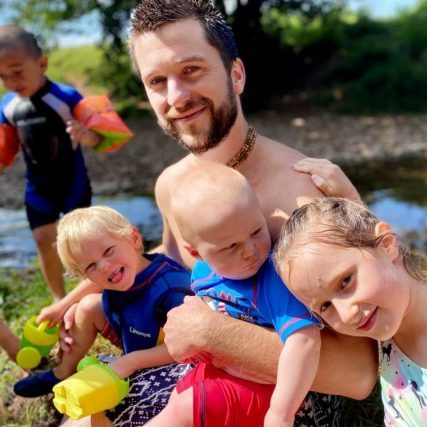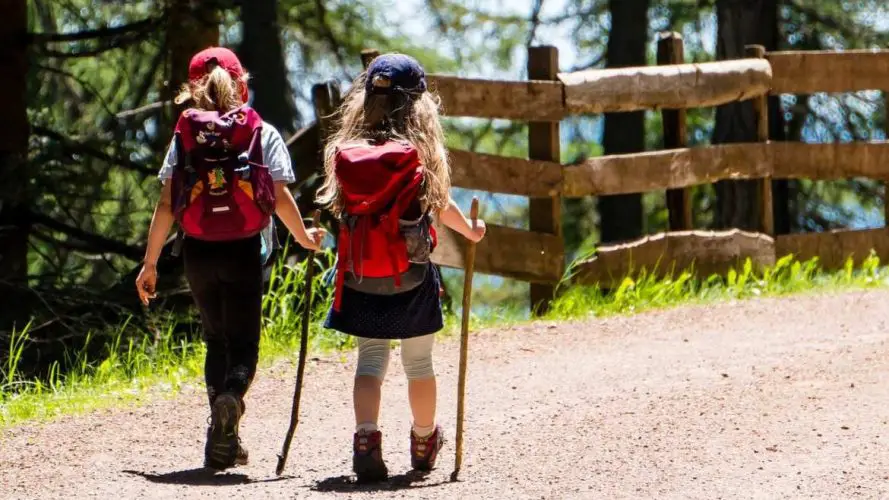In this age of screens and so-called ‘digital connectedness,’ a quiet counter-culture is emerging. A growing movement of parents and guardians are recognizing the vital importance of unplugging their kids and getting them outdoors.
What does all this mean? Hiking is back, baby!
Yes, humble hiking, the back-to-basics pastime where families head out into the wild to put one foot in front of the other, is gaining in popularity once more. It is now heralded as indispensable for “whole-child” development, and there is plenty of science to back this up.
Studies now reveal that hiking is much more than just exercise; children reap social, emotional, and cognitive benefits too. It also provides opportunities to bond while learning about and appreciating our natural environment.
Keep your trail guide at the ready, because we’re about to explore exactly why hiking is so awesome for kids!
Incredible hiking benefits (infographic)

Digging deeper: How hiking benefits children
Character development
1) Develops Initiative
The drive to shoulder responsibilities, complete tasks, and take initiative often comes from confidence gained through lived experiences. Hiking can help kids see the power and importance of staying motivated, involved, and aware, helping them to develop a sense of initiative at school and at home. (Source)
2) Teaches appreciation of the environment
Finding a fondness and respect for nature early in life helps children to develop a positive attitude toward conservation and a desire to preserve our planet. Hikes often take kids out of their comfort zones, showing them new aspects of their daily environment which pique curiosity, stimulate learning, and create appreciation for nature’s diverse beauty. (Source)
3) Encourages free play
Free play happens when kids have time and opportunity for exploration without being directed by an adult. It’s developmentally important to kids, and time spent outside tends to facilitate free play naturally. Going on a hike offers plenty of opportunities for kids to use logic, imagination, motor skills, and social skills — all important hallmarks of free play. (Source)
4) Increases mindfulness
Mindfulness, a term often used in meditation, refers to self-awareness; being mindful encourages us to get in touch with our feelings and motivations, and to be engaged in the present moment rather than distracted — this is an important part of developing character and maintaining emotional well-being. Time spent in nature, specifically while hiking, is correlated with an increase in feelings of mindfulness. (Source)
5) Offers opportunities for reflection
Often, taking time to reflect on difficult situations or events in our lives is how we come to conclusions about our feelings, learn lessons about what occurred, and figure out how to proceed in the future. A quiet hike through nature provides opportunities for reflective and meditative thoughts that are important to the development of character and integrity. (Source)
6) Helps create feelings of optimism
Maintaining a positive outlook can sometimes be difficult for kids who are going through a rough time. Without the life experience that helps us push through conflict and adversity, it can be tough to see the forest from the trees when trying to cope with negative feelings. Time spent hiking is associated with reduced tension and fewer negative thoughts, and can leave kids feel reinvigorated and engaged.(Source)
7) May inspire the discovery of a passion
A lifelong love of physical activity is the cornerstone of a healthy life, and it’s often created through positive childhood experiences that include staying active. Family hikes are a great way to help kids get enthusiastic about the great outdoors, and in some cases, they may develop a lasting passion for hiking that will keep them both fit and happy in the years to come. (Source)
8) Allows children to test their limits
Testing boundaries is a natural and important part of childhood development, even when they’re driving parents up the wall. The kind of limit testing that happens during outdoor activities like hiking is a bit easier to take, because it often means testing endurance and physical ability within a relatively safe scope. They’ll be thrilled when they conquer a steep slope on their own, carry their pack without help for the first time, or break their record for longest trail. (Source)
Cognitive skills
9)Improves problem solving ability
Tackling a problem in need of solving may require logic, reason, creative thinking, and other cognitive skills, which develop and improve through experience. Time spent in nature often provides opportunities to develop these related skills, and can also create situations where a child might need to solve a problem or make an executive decision. Experience with doing so is how they develop confidence and become better problem solvers. (Source)
10) Prompts creative thinking
Often, thinking outside the box is necessary to find the best solution to a problem or method of doing something. Some kids naturally see things creatively, but for others, diverse life experiences are needed to help trigger creative thoughts. Letting kids make free, unprompted decisions and use their imaginations is helpful in encouraging creative thought, both of which can be incorporated into outdoor activities like hiking. (Source)
11) Inspires use Of the imagination
The more children engage with their environment, the more they learn, and the more they have to contemplate in a creative way. As they consider new plants, animals, and places, a child’s imagination often naturally gravitates toward imagining stories of their origin, what they do, and what they might be used for. By providing a change of scenery, deeper and more imaginative thought can happen naturally. (Source)
12) Boosts cognitive ability
The use of logic, reasoning, perception, attention, and memory are all related to cognitive ability, the set of skills we all use to navigate our day-to-day lives. These skills must be developed throughout childhood, and the kind of educational experiences in nature which hiking can provide offer exceptional opportunities for children to both develop and exercise these abilities. (Source)
13) Helps maintain focus
The ability to maintain focus can be challenging for some children, which isn’t terribly surprising — we live in a highly distracted society, where their attention is often being redirected before they even have a chance to realize it. Empirical studies relating to natural environments have found that activities like hiking help to restore focus by avoiding directed attention, letting the mind truly rest. (Source)
14) Reduces confusion
Feeling disoriented, confused, and in a fog can sometimes be part and parcel of going through a rough time. This can be especially true for teenagers, who are dealing with physical and hormonal changes, scholastic pressure, and a developing social life on top of day-to-day nuisances. A study on outdoor exercise in older adolescents determined that activities like hiking have the potential to help teens reduce these feelings of confusion. (Source)
15) Gives them more energy
Most of us have heard Newton’s first law of motion repurposed as a cute tautology about staying active: “An object at rest stays at rest”. While the scientific concept doesn’t quite track with human beings and exercise, it’s true that getting up and out into nature for a hike can boost energy, encouraging kids to stay in motion and be more active — this is especially helpful for teens, who may seem sleepier now than they did as infants. (Source)
Learning and skill building
16) Demonstrates important safety skill
An important part of healthy, happy outdoor play includes learning the skills needed to stay safe outside. Hiking is a great way to demonstrate these skills — some, like proper foot placement, use of gear, and first aid, must be taught, but other, more basic skills will be learned naturally. It offers a great chance for kids to get acquainted with basic field safety, which is a valuable life skill. (Source)








